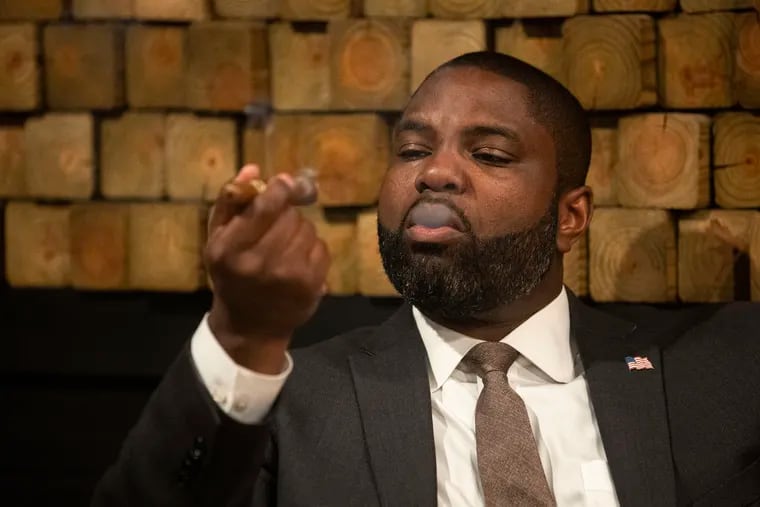
In his struggle to fend off the furor he caused after suggesting Black people were better off under Jim Crow segregation at an event in Philadelphia aimed at helping the GOP reach Black voters, a frustrated U.S. Rep. Byron Donalds (R., Fla.) told CNN Wednesday:
“Let’s agree on something: I am, you know, obviously, one of the better communicators in the Republican Party.”
Others — many others, it turns out — appear to disagree.
» READ MORE: Rep. Byron Donalds draws backlash for expressing nostalgia for Jim Crow era during Philly event
The backlash against Donalds, whose comments were first reported by The Inquirer Tuesday night, has been swift and relentless. So fierce is the vitriol, in fact, that a spokesperson for former President Donald Trump stressed in an interview Thursday, “Please make it clear: this was not said at an official Trump event.” Donalds has been named as a potential running mate for Trump as he searches for a vice presidential candidate that would help him increase his popularity at the polls in November.
Here is what to know about a moment in politics that began in a Philly cigar bar, made it to the floor of Congress, and could reshape Trump’s run for the White House.
Just what did U.S. Rep. Byron Donalds say in Philly?
Donalds referenced the Jim Crow era of racial segregation and disenfranchisement during an event in Philadelphia on Tuesday. He said this:
“You see, during Jim Crow, the Black family was together. During Jim Crow, more Black people were not just conservative — Black people have always been conservative-minded — but more Black people voted conservatively. And then H.E.W., Lyndon Johnson — you go down that road, and now we are where we are.”
Donalds was referring to President Lyndon Johnson’s Great Society programs, which expanded social services and aid programs for low-income Americans. Many of those programs were implemented by the former U.S. Department of Health, Education and Welfare, or H.E.W. Johnson introduced this legislation on the heels of the Civil Rights Act of 1964 and the Voting Rights Act of 1965, which overturned the Jim Crow-era caste system that enabled African Americans to remain unequal, second-class citizens after slavery was abolished.
The comments, first reported by The Inquirer on Tuesday night, came during a “Congress, Cognac, and Cigars” event featuring Donalds and U.S. Rep. Wesley Hunt (R., Texas). Both men are conservative Black Republicans, and the event was the first in a series aimed at helping the GOP reach Black voters and promote former President Donald Trump’s campaign to retake the White House.
Listen here:
What are people saying?
On the floor of the U.S. House of Representatives on Wednesday, Minority Leader Hakeem Jeffries of New York did not hold back:
“That’s an outlandish, outrageous and out-of-pocket observation,” referencing the oppression of the Jim Crow era in the South, running from the 1877 to the mid-1960s.
“How dare you make such an ignorant observation? You better check yourself before you wreck yourself.”
Sarafina Chitika, a spokeswoman for Mr. Biden’s campaign, was no less assertive, telling the New York Times:
“Donald Trump spent his adult life, and then his presidency, undermining the progress Black communities fought so hard for — so it actually tracks that his campaign’s ‘Black outreach’ is going to a white neighborhood and promising to take America back to Jim Crow.”
In a statement to The Inquirer on Thursday, Brian Hughes, Trump campaign senior adviser, took the president to task:
“The Biden campaign is arguing that a Black Member of Congress talking to a Black audience about Black history needs lessons from the campaign of an 81-year-old feeble white man who said to Black voters if they don’t vote for him ‘you ain’t Black.’ This kind of hypocrisy is why record numbers of Black voters are supporting President Trump.”
As it happens, Biden himself was once connected to a Jim Crow reference, according to the Rutgers Eagleton Institute of Politics. In 2019, Trump surrogates wrote in a fundraising email that “Jim Crow Joe” had not done enough for the Black community in his nearly 50 years of public service.
In a tweet, Rep. Gregory Meeks, a Democrat from New York, wrote, “This is ignorant. The Jim Crow era inflicted deep wounds on Black families through segregation laws, economic disenfranchisement and violence.
“Our country is still reeling from this stain in American history.”
Rebuking Donalds along with others in his party, the Congressional Black Caucus also weighed in on Wednesday: “This is a pattern of embracing racist ideologies that we see time and again within the MAGA Republican Party.”
Donalds’ remarks were “shameful and beneath the dignity of a member of the House of Representatives. He should immediately offer an apology to Black Americans for misrepresenting one of the darkest chapters in our history for his own political gain.”
Who is U.S. Rep. Byron Donalds?
Long connected to conservative causes, Donalds, 45, was once accused by Rep. Cori Bush (D-MO) of being a “prop” who supports “white supremacy.” He vehemently denied the charge.
Donalds endorsed Trump’s false claim that the 2020 presidential election was illegitimate, voting to reject state-certified results from Arizona and Pennsylvania. He is close with controversial Florida Gov. Ron DeSantis (R) and has opposed gun control and the investigation into the Jan. 6, 2021, riot.
During a fundraiser at Mar-a-Lago last month, Trump said Donalds had “something very special out there politically” and the Florida lawmaker continues to be floated as a potential contender for vice president.
He’s married to Erika Donalds, a conservative education activist. Both she and her husband, according to the New York Times, have deep ties to right-wing groups such as Moms for Liberty, which has done significant advocacy work in the Philadelphia suburbs to elect conservative school board candidates, ban books that they said “indoctrinate children with liberal ideas,” and fight masking mandates during the COVID-19 pandemic. Moms for Liberty held its national convention in Philadelphia last spring featuring Trump, who made his 2024 pitch for the White House there and attracted hundreds of protesters.
They are also linked to Hillsdale College, which has been a source of curriculum embraced by conservative activists, including in the Philadelphia suburbs.
What’s Jim Crow and how is it currently viewed?
Jim Crow was the name of the racial caste system that operated primarily, but not exclusively, in southern and border states, between 1877 and the mid-1960s, according to the Jim Crow Museum of Racist History in Big Rapids, Mich.
“Jim Crow, the legitimization of anti-Black racism, was more than a series of rigid anti-black laws — it was a way of life,” according to the museum. “Many Christian ministers taught that white people were the Chosen people, Black people were cursed to be servants, and God supported racial segregation.”
Marriage historian Stephanie Coontz, author of “The Way We Never Were: American Families And The Nostalgia Trap,” said in an interview with The Inquirer on Thursday that “marriage was given a magical quality it never had during Jim Crow. Under the stress and adversity of Jim Crow, just being married did not save Black people from the extraordinary difficulties of the day.”
Lynchings, the murders of children, humiliating attacks on successful Black people who had their possessions stolen, and white repression all marked the time, said Coontz, director of research at the Council on Contemporary Families.
Asked her view on Donalds’ statement, she concluded, “It’s insane to think Jim Crow was a better time from people just because Black people had high rates of marriage.”


